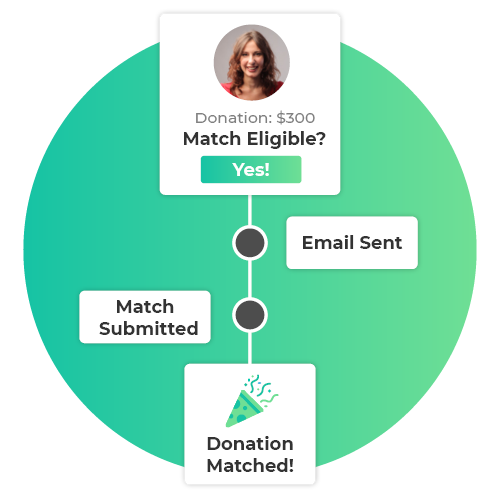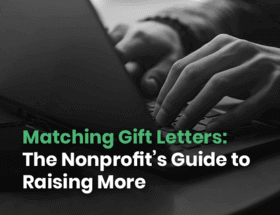Corporate philanthropy is more than a buzzword. It’s now an expectation. Nonprofit organizations are constantly faced with the challenge of raising funds from diverse sources, such as individual donors, grant programs, corporate collaborations, and other avenues. Simultaneously, businesses recognize the need to invest in their communities, not just as a commitment to social responsibility but also as a strategic move to enhance their reputations.
Within this intersection of philanthropic aspirations and corporate interests, the foundations of impactful partnerships are laid. Corporate philanthropy enables companies to give back to the communities that support them and fund meaningful societal advancements.
In this article, we’ll delve into the essentials of giving back, offering guidance for nonprofits and companies to navigate this realm and create meaningful impact. Here’s what we’ll cover:
- What is Corporate Philanthropy?
- The Benefits of Corporate Philanthropy
- 8 Types of Corporate Philanthropy Programs
- Examples of Corporate Philanthropy
- Corporate Philanthropy Best Practices for Nonprofits
- Corporate Philanthropy Best Practices for Businesses
- How Corporate Giving Tools Help Nonprofits Grow Impact
We work with nonprofits every day to leverage one of the most powerful forms of philanthropy: matching gifts. We’re happy to share our insights into how nonprofits and companies can make the most of these programs and similar initiatives.
What is Corporate Philanthropy?
Corporate philanthropy refers to a company’s voluntary activities or investments in the betterment of society. It describes deliberate efforts to contribute resources, funds, and support to nonprofits. Typically, this involves monetary donations, in-kind gifts, community engagement initiatives, or employee volunteerism.
The primary purpose of corporate philanthropy is to make a positive social or environmental impact while aligning efforts with the company’s values. These programs are one way businesses can put social responsibility into concrete action.
The Difference Between Corporate Philanthropy and Corporate Social Responsibility
Corporate philanthropy is not the same as corporate social responsibility (CSR).
CSR is a broader framework encompassing a wide range of voluntary initiatives and actions a company takes to address its impact on society and the environment. It includes ethical business practices, sustainability efforts, responsible supply chain management, employee well-being, and social impact. Corporate giving is just one subset of CSR that focuses specifically on charitable giving.
The Benefits of Corporate Philanthropy
Corporate giving impacts everyone involved, including nonprofits, companies, their employees, and society. Let’s look at the broader benefits and then focus on those for nonprofits and companies specifically.
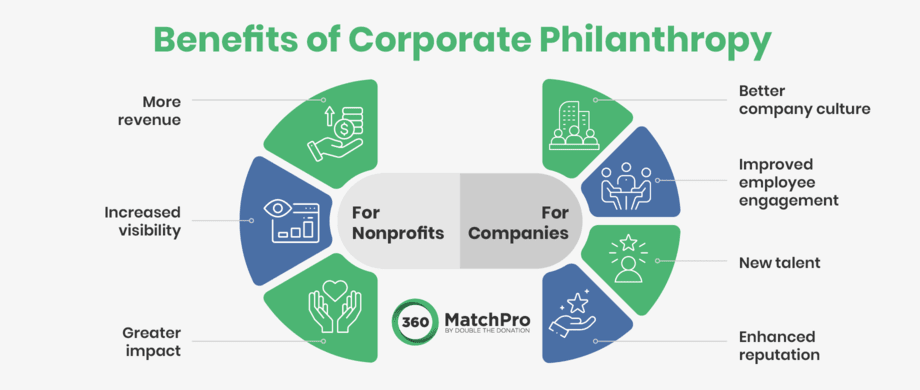
Corporate Philanthropy Statistics
The numbers don’t lie—corporate philanthropy has a major impact. Here’s an overview of the current corporate giving landscape:
in matching gift funds go unclaimed per year.
say they’re more likely to donate if a match is offered.
who engage in corporate volunteering have an improved perception of their employer.
indicate that companies must demonstrate how they positively impact communities and the environment to win their support.
(Sources: our corporate giving statistics, our nonprofit fundraising statistics, Nonprofits Source’s corporate giving trends, Kambeo’s corporate volunteering statistics, Porter Novelli Purpose Premium Index)
All of these statistics point to one overarching takeaway: corporate giving matters. Whether you work for a company or a nonprofit, you’re missing out if you don’t engage in these initiatives.
How Companies Benefit from Corporate Philanthropy
Businesses are in the driver’s seat when it comes to corporate giving. Whether a startup or a major corporation, any size company can get in on the action and reap the benefits of these programs.
By developing a strong corporate giving strategy, businesses can:
- Create a better company culture. Encouraging employees to contribute to causes they care about can increase their fulfillment and satisfaction. They’ll feel like they’re working toward the company’s success and the well-being of the larger community.
- Improve employee engagement. Gallup’s State of the Global Workplace report found that 85% of employees aren’t engaged at their companies. By empowering employees to make a difference by participating in corporate philanthropy programs, businesses can cultivate productive, enthusiastic teams. After all, according to Double the Donation’s employee engagement guide many employees take pride in working for companies that prioritize social responsibility.
- Attract new talent. Paul Polman’s employee engagement report reveals that 66% of U.K. employees and 76% of U.S. employees want to work for companies positively impacting the world. Therefore, companies with thoughtful corporate philanthropy initiatives can increase their chances of recruiting top talent.
- Improve customer relationships. According to an Ivalua study, 69% of business decision-makers reported having increased their sales due to their CSR initiatives. In other words, consumers actively seek out companies that positively impact their communities.
- Boost their reputation. By supporting charitable causes, companies can demonstrate they’re interested in more than making money. This can be an excellent way to stand out from competitors and appeal to more customers.
- Expand their corporate network. Charitable companies that pursue social good are more likely to forge partnerships with like-minded companies with the same values. Together, they can hit their business KPIs while expanding their community impact.
Ultimately, as a company’s philanthropic efforts continue to enhance its public image, it can build stronger relationships with social-minded job seekers, employees, nonprofit partners, and consumers.
How Nonprofits Benefit from Corporate Philanthropy
Nonprofits need significant funds, technology, manpower, and time to generate impact. Corporate philanthropy programs provide some of these essential resources.
With more businesses focusing on their philanthropic duties, nonprofits stand to gain a lot from these programs, such as:
- More revenue. Corporate philanthropy initiatives, such as matching gifts and volunteer grants, issue critical funding to nonprofits. These opportunities allow nonprofits to diversify revenue sources and secure the support needed to fulfill their missions.
- Increased visibility. By partnering with companies, nonprofits can spread awareness of their causes. This can lead to more donors, volunteers, and advocates who have yet to learn about the organization.
- Greater impact. Philanthropy-minded companies can set nonprofits up to create a greater impact by providing crucial funds and services to support their work. For instance, they can sponsor fundraising events, provide in-kind donations, offer corporate volunteering support, and contribute pro-bono services.
While corporate philanthropy programs bring significant value to nonprofits, our research indicates that many organizations are missing out, specifically when it comes to individual support. When donors give, they’re invested in playing a role in the nonprofit’s impact. However, they may not be aware that workplace giving opportunities can strengthen that support.
We’ll explore this strategy later, but for now, know that corporate philanthropy software, such as a matching gift automation tool, can automatically identify whether a nonprofit’s donors are eligible for matching gifts. What’s more, nonprofits can use it to follow up and ensure eligible donors submit a request to their employer.
8 Types of Corporate Philanthropy Programs
One of the best parts of corporate philanthropy is there are plenty of different ways for companies to get involved with nonprofits. Let’s explore eight common types. That way, nonprofits will know what opportunities to seek out, and companies can pick the initiatives that align with their CSR goals.
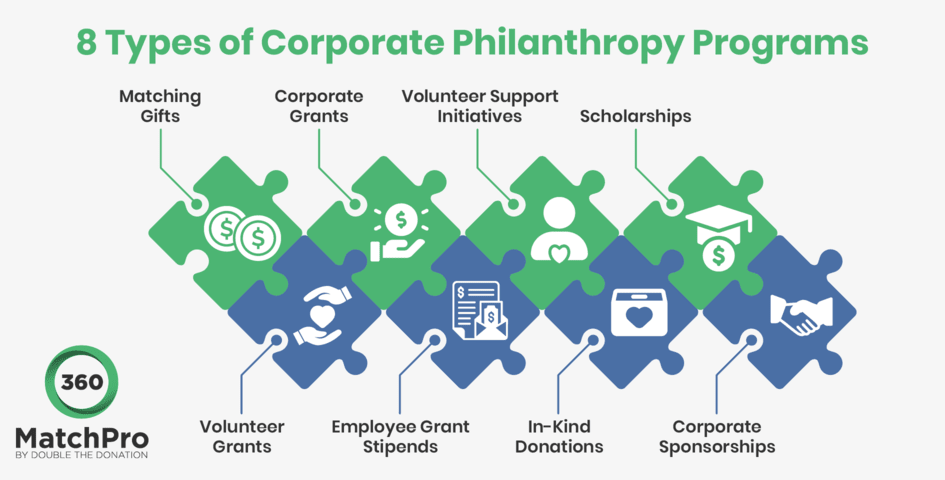
1. Matching Gifts
A matching gift program is a corporate philanthropy initiative in which companies financially match their employees’ donations to nonprofit organizations. While most companies match gifts at a 1:1 ratio, some will match at a higher ratio, such as 2:1 or even 3:1. With the standard 1:1 match, companies promise to match each employee’s charitable contributions dollar-for-dollar, resulting in twice the impact.
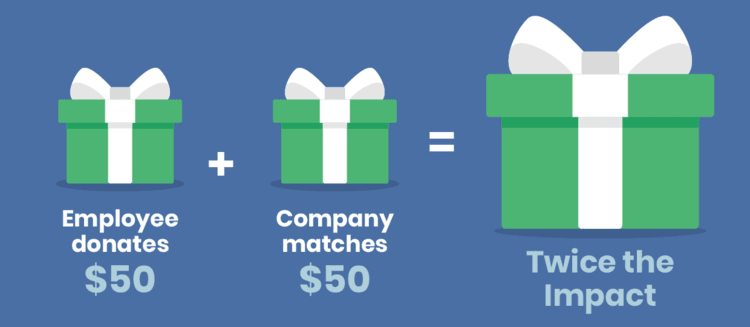
To secure a matching gift, employees must follow this process:
- The individual donates to a nonprofit.
- They check their eligibility for a company donation match using a matching gift search tool.
- If eligible, the search tool will populate the necessary information and forms the employee can use to submit a match request.
- The employee submits a request, and the company verifies the donation with the nonprofit.
- The company provides a donation match.
For larger nonprofits that generate a substantial amount of matching gift revenue each year, investing in a matching gift automation platform can help secure more funds while minimizing the effort needed to locate opportunities. With a tool that automates outreach based on eligibility, organizations can identify more match-eligible donors and drive matches to completion.
2. Volunteer Grants
Volunteer grants are another type of corporate philanthropy in which companies issue monetary grants to nonprofits depending on how much time their employees volunteer there. While companies often require employees to meet a certain threshold of hours before issuing a grant, others will award grants for any number of hours.
To secure a volunteer grant, employees generally follow this process:
- The employee volunteers with a nonprofit.
- The employee checks their eligibility for a volunteer grant by using a company search tool.
- If eligible, the search tool will populate the necessary information and forms the employee can use to submit a request for a volunteer grant.
- The employee submits their volunteer grant request via a company portal or volunteering platform, and their employer verifies the hours with the nonprofit.
- The company provides a monetary grant to the nonprofit.
Similar to matching gifts, many volunteers are unaware their companies offer a volunteer grant program, resulting in nonprofits missing out on additional revenue. Luckily, our tools also house volunteer grant information, making this another instance when investing in an automation platform like 360MatchPro by Double the Donation comes in handy. Our platform can help large nonprofits secure more volunteer grants without adding extra pressure on their teams.
3. Volunteer Support Initiatives (VTO)
Some companies launch volunteer support initiatives to encourage employees to contribute their time and skills in an organized, deliberate manner. They may partner with nonprofits to set up volunteer events or offer paid volunteer time off (VTO) to incentivize employees to give back to their community.
These initiatives provide specialized support to nonprofits by empowering employees to contribute their skills. For example, corporate volunteers from a digital marketing agency may host training sessions to teach nonprofit staff members how to leverage search engine optimization (SEO) to reach more supporters.
4. Corporate Grants
Through corporate grants, companies invest in their communities by funding nonprofits directly. These grants can be unrestricted, allowing nonprofits to use the funding wherever they see fit. Alternatively, they can be restricted to a specific type of program or project.
To create corporate grant opportunities, companies should determine the grant’s objectives and focus areas. These should align with their overall mission and values. Then, they must develop a budget, set eligibility criteria, and establish an application process.
To win one of these grants, nonprofits must apply by submitting a grant proposal that outlines their case for support and other basic details about their work. Then, the company will decide which organizations will receive the funding based on mission alignment and proposed impact. However, some grants, like the Google Ad Grant, contribute funding to an unlimited number of nonprofits as long as they meet the eligibility criteria.
5. Employee Grant Stipends
This type of corporate philanthropy involves awarding grants to employees, allowing them to decide which organizations receive funding from the company.
Grant stipends don’t require any financial investment from employees, meaning they are not deducted from salaries. Instead, this program can be added to an employee benefits package, allowing businesses to attract and engage more socially conscious workers.
6. In-Kind Donations
In-kind donations are non-monetary contributions companies can incorporate into their corporate giving strategies. Rather than issuing funds, businesses can donate goods and services, making it easier for nonprofits to complete their work.
For instance, a company may donate office supplies or technology equipment. Depending on the nonprofit’s needs, it could enlist employees to provide services, such as accounting or graphic design, at no cost to the organization.
7. Scholarships
Scholarships are popular corporate philanthropy initiatives that allow companies to invest in educating the next generation of talented employees. These opportunities can be need-based or merit-based, requiring individuals to apply for financial support to mitigate costs such as tuition, books, and other school-related expenses.
8. Corporate Sponsorships
Corporate sponsorships refer to a mutually beneficial partnership between a company and a nonprofit. The company funds an event, project, or program. In exchange, the nonprofit publicly acknowledges the company’s support on its website, social media posts, and other marketing materials. This partnership allows nonprofits to receive the funds they need and businesses to boost their reputations.
Examples of Corporate Philanthropy Programs
While there are many companies out there with corporate philanthropy initiatives, we’ll explore notable examples that stand out based on the extent of their generosity. These companies’ programs are worth emulating based on their simplified employee participation process and notable generosity.
Every year, Google donates $200 million to nonprofits and social enterprises worldwide.
For its employees, Google has both a matching gift program, with a maximum match amount of $10,000 per employee, and a volunteer grant program, which contributes $10 for every hour an employee volunteers with a nonprofit.
Another aspect of the company’s philanthropy is its Ad Grants program. This grant awards eligible nonprofits $10,000 a month to spend on ads that will display on Google’s search results pages, empowering them to expand their reach and get in front of more potential supporters.
Disney is a well-known media and entertainment company that has made a substantial impact through its philanthropic initiatives, contributing around $233 million to charitable organizations just in the last year.
The company’s corporate philanthropy programs include matching gifts and volunteer grants. Disney will match donations dollar-for-dollar up to $25,000 for each full- or part-time employee every year. Through the Disney VoluntEARS Grant program, the company will award grants of up to $2,000 to nonprofits depending on how many hours an employee volunteers there.
Wells Fargo is an American multinational financial services company that has donated hundreds of millions of dollars to housing assistance, sustainability, small business growth, and financial health.
Wells Fargo’s corporate philanthropy initiatives include a matching gifts program and two types of volunteer grant programs: one for employees who volunteer a certain number of hours with a nonprofit and one for those who serve on a 501(c)(3) organization’s governing board.
In fiscal year 2023, Walmart donated more than $1.7 billion in cash and in-kind donations to programs that align with the company’s philanthropic values.
Walmart pursues corporate philanthropy initiatives in four core areas:
- Creating opportunity
- Advancing sustainability
- Strengthening community
- Advancing racial equity
Walmart also offers an executive-level matching gift program in which they’ll match donations up to $25,000. In addition, the company offers volunteer grants of $10 for each hour an employee volunteers.
Apple partners with various charitable organizations to pursue development projects, including organizations that help fight to end AIDS, promote racial justice, and provide food to those in need. Apple even pledged $200 million to support racial equity initiatives and show continued commitment to the cause.
Plus, Apple matches employee donations up to $10,000. The company’s employee giving program has raised $880 million and contributed over 2 million volunteer hours since its founding almost 12 years ago.
Corporate Philanthropy Best Practices for Nonprofits
As more businesses prioritize corporate philanthropy, nonprofits must develop a strategy to maximize these opportunities. Here’s how to create a revenue-boosting corporate giving strategy for nonprofits:
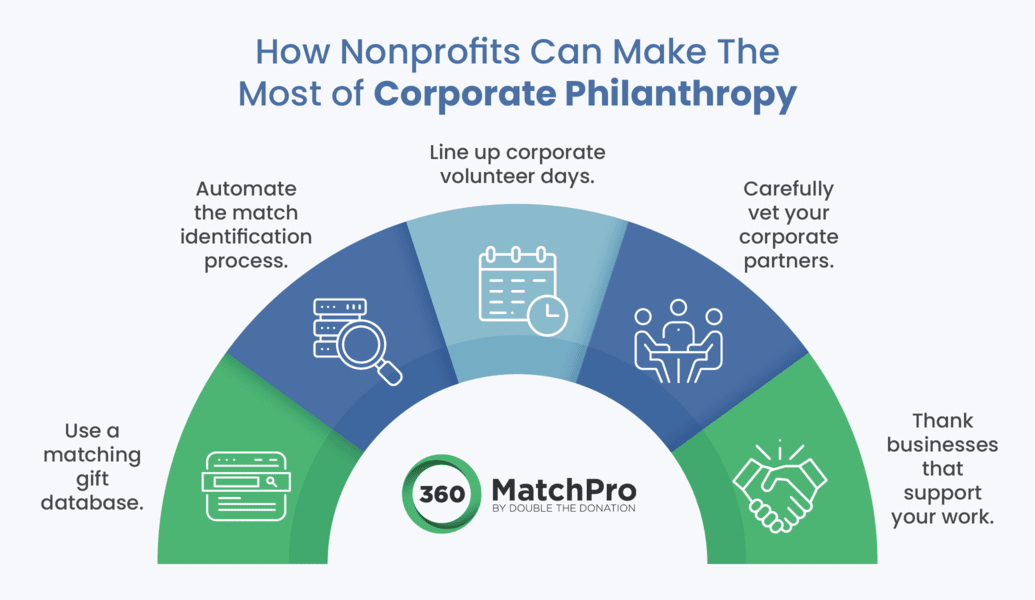
- Use a matching gift database. Leverage technology, such as matching gift software, to streamline corporate philanthropy participation. Our database houses 24,000+ company records, making it easy to pinpoint corporate matches and volunteer grant opportunities.
- Automate the match identification process. A matching gift automation platform will automatically determine donors’ match eligibility. If eligible, the platform will then automate outreach and encourage them to submit a match request to their employer.
- Line up corporate volunteer days. Work with corporate partners to organize volunteer opportunities and participate in fundraising events. Think through the types of volunteer support you need first!
- Partner with companies whose missions align with the nonprofit. Seek corporate partners whose mission and philanthropic goals align with your nonprofit’s mission. For example, a local grocery store makes a great partner for a food bank. A shared purpose will enhance the partnership’s impact and longevity.
- Thank corporate partners. Whether they sponsor an event or donate to an annual toy drive, send prompt, personalized thank yous to corporate partners.
Building strong, productive relationships with companies can lead to significant long-term support. Implement these best practices, and corporate giving will contribute to a reliable support system.
Corporate Philanthropy Best Practices for Businesses
With all the benefits of corporate philanthropy, you’re probably excited to start tapping into these programs right away. However, a company’s initiatives will differ depending on its mission, resources, and employees.
Here’s how businesses can create a strong corporate giving strategy:
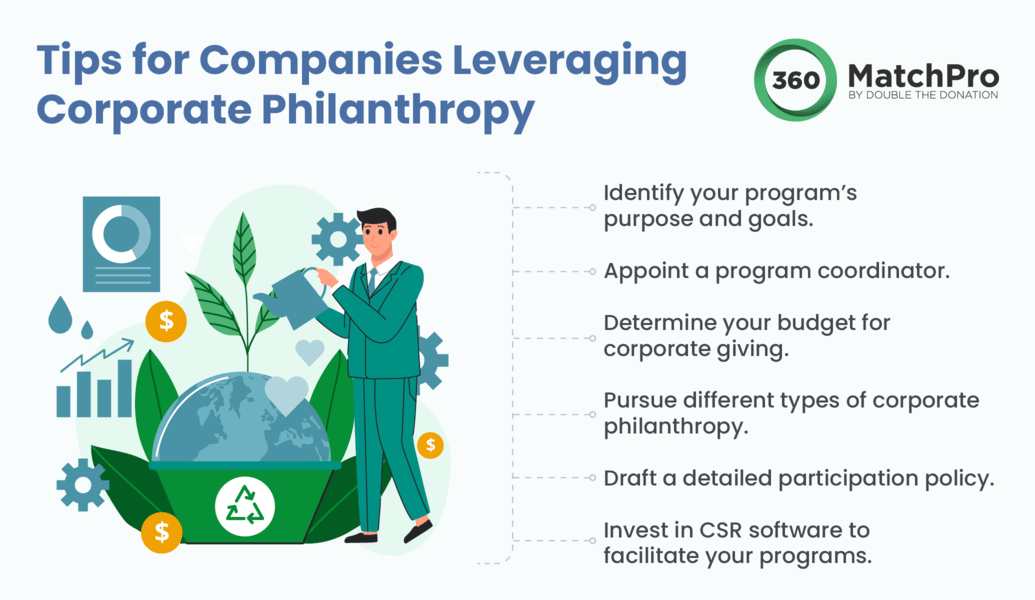
- Identify the program’s purpose and goals. Clearly articulate why your company is engaging in philanthropic activities, whether it’s to support local communities or address specific social or environmental issues. Setting clear objectives will guide your program’s development and ensure contributions are directed toward meaningful initiatives.
- Appoint someone to lead the program’s development. A coordinator will be responsible for program planning, implementation, and management. They will align the program with the company’s mission, oversee nonprofit partnerships, and ensure effective communication and engagement with employees and stakeholders.
- Determine your company’s budget for philanthropic activities. This ensures your program remains sustainable and aligned with your financial capacity. Consider the amount allocated for charitable donations and the operational costs associated with running the program.
- Draft a detailed participation policy. Develop a comprehensive policy outlining the eligibility criteria for nonprofits and the guidelines for employee participation. Then, communicate expectations for nonprofits seeking assistance and employees engaging in volunteer work or fundraising efforts.
- Pursue different types of corporate philanthropy. Diversify your impact with traditional monetary donations, in-kind contributions, employee volunteer programs, or cause-related marketing campaigns. By pursuing different avenues of philanthropy, you can cater to different objectives and reach a broader audience.
- Invest in CSR software. These platforms enable you to facilitate programs, such as by vetting matching gift applications, awarding volunteer grants, and tracking employee volunteer hours. You can also track relevant program performance metrics to refine your corporate philanthropy efforts over time. And when you work with a CLMA-certified vendor, you can enure your program engagement process is streamlined and accessible with matching gift auto-submission, too!
Following in other companies’ footsteps can put you on the right track. That way, you can pick which aspects you like and design a strong corporate giving strategy for your company.
How Corporate Giving Tools Help Nonprofits Grow Impact
Using a corporate philanthropy database makes it easy for donors to determine their eligibility. These platforms contain information on thousands of companies and their philanthropic initiatives.
However, if you’re a large organization that generates more than $25,000 annually in matching gift revenue, sometimes simply promoting the use of a database isn’t enough. That’s why automating the entire process can generate more revenue.
360MatchPro Overview
360MatchPro by Double the Donation is an automation platform that streamlines the process of securing matching gifts. This software frees up your staff members’ time and energy to focus more on your mission.
The automation process works like this:
- A donor gives to your organization and enters their email address and employer information to determine their matching gift eligibility.
- 360MatchPro’s automated platform uses this information to identify whether they’re match-eligible. Our database covers 99.68% of all match-eligible donors, including those in the U.S. and Canada.
- Depending on the donor’s eligibility, 360MatchPro will trigger an email to the donor explaining their next steps. If a donor is eligible, the email will prompt them to submit a match request and provide instructions. If they are ineligible or undetermined, they will receive instructions on manually checking their eligibility.
- Your organization can track the match from start to finish. Donors can even click a button in the automated emails to indicate they’ve submitted their match request.
The matching gift process is even easier for donors who work for companies with standout corporate philanthropy software that integrates with 360MatchPro (these are also known as CLMA-certified companies, or Certified Leaders in Matching Automation). With the auto-submission feature, they only need to make a gift and provide their email. Then, Double the Donation will automatically submit a matching gift request on their behalf. Watch this video for an overview:
When your team has actionable data and more time to invest in your mission, you can raise funds to put on events, promote your cause, and focus on other tasks you may not have otherwise accomplished. Consider adding 360MatchPro as part of your nonprofit’s essential toolkit!
Additional Corporate Philanthropy Resources
Today, consumers and employees expect a certain level of accountability from businesses. Meanwhile, nonprofits need all the support they can get, whether through monetary gifts, volunteerism, or in-kind support.
A strong corporate giving strategy is a proven way to accomplish that. Businesses and nonprofits alike can easily get in on corporate philanthropy. We recommend matching gifts as the easiest way to get involved. In the meantime, check out these additional resources to learn more:
Matching Gifts: The Basics + Growing Revenue with Automation
Looking to find more information about matching gifts and automation?
Check out our expert’s guide!
How to Unlock Corporate Giving: The Key to Boost Donations
Corporate giving initiatives provide significant benefits for nonprofits and companies.
Learn more about top corporate giving programs and companies in this guide.
Matching Gift Letters: The Nonprofit’s Guide to Raising More
Secure more matching gifts for your nonprofit by crafting matching gift letters.
Follow these steps for success.









